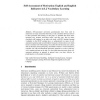Free Online Productivity Tools
i2Speak
i2Symbol
i2OCR
iTex2Img
iWeb2Print
iWeb2Shot
i2Type
iPdf2Split
iPdf2Merge
i2Bopomofo
i2Arabic
i2Style
i2Image
i2PDF
iLatex2Rtf
Sci2ools
AIED
2011
Springer
2011
Springer
Self-assessment of Motivation: Explicit and Implicit Indicators in L2 Vocabulary Learning
Self-assessment motivation questionnaires have been used in classrooms yet many researchers find only a weak correlation between answers to these questions and learning. In this paper we postulate that more direct questions may measure motivation better, and they may also be better correlated with learning. In an eight week study with ESL students learning vocabulary in the REAP reading tutor, we administered two types of selfassessment questions and recorded indirect measures of motivation to see which factors correlated well with learning. Our results showed that some user actions, such as dictionary look up frequency and number of times a word is listened to, correlate well with self-assesment motivation questions as well as with how well a student performs on the task. We also found that using more direct selfassesment questions, as opposed to general ones, was more effective in predicting how well a student is learning. Key words: Motivation Modelling, Intelligent Tutoring Systems...
| Added | 24 Aug 2011 |
| Updated | 24 Aug 2011 |
| Type | Journal |
| Year | 2011 |
| Where | AIED |
| Authors | Kevin Dela Rosa, Maxine Eskenazi |
Comments (0)

